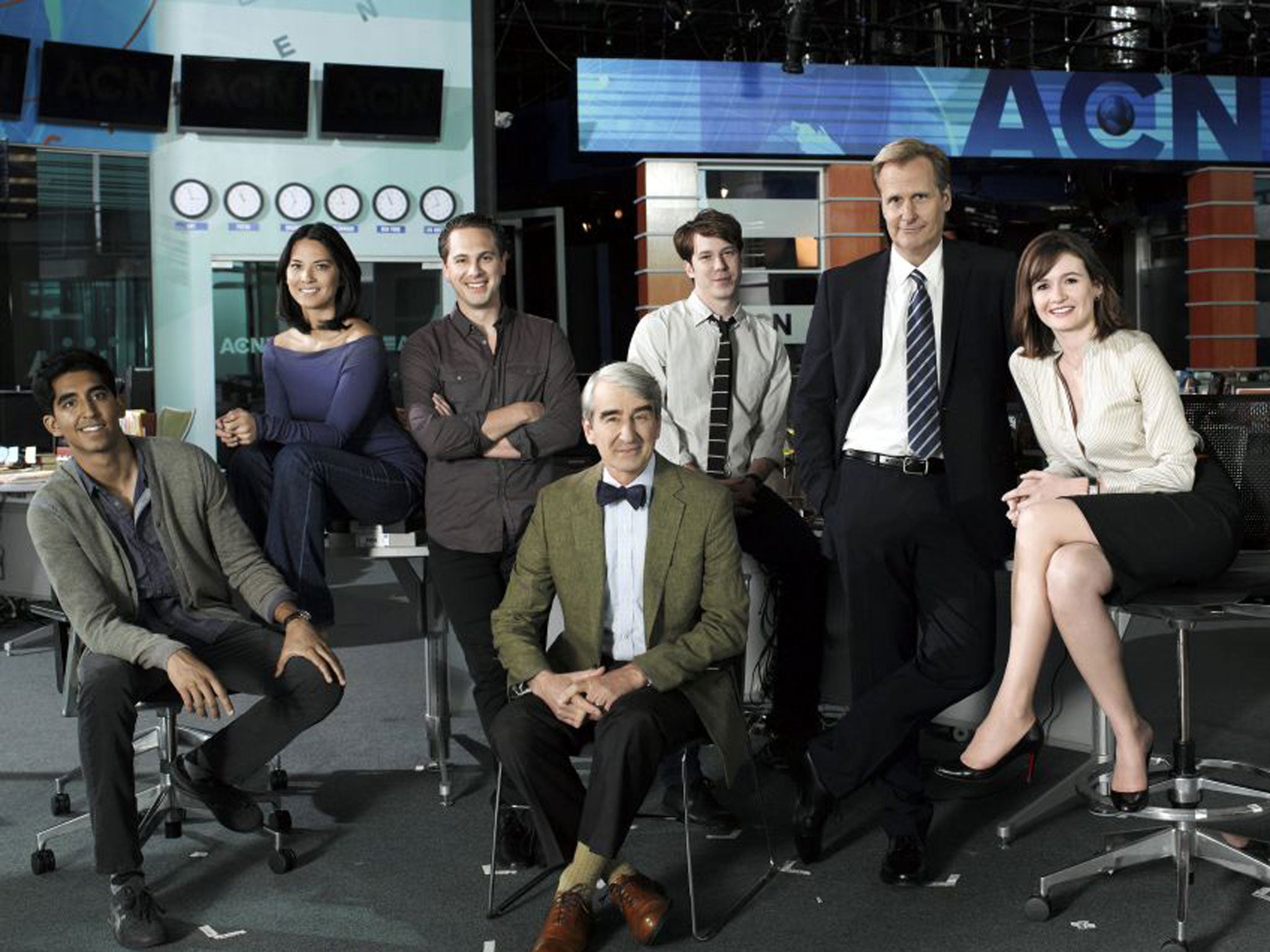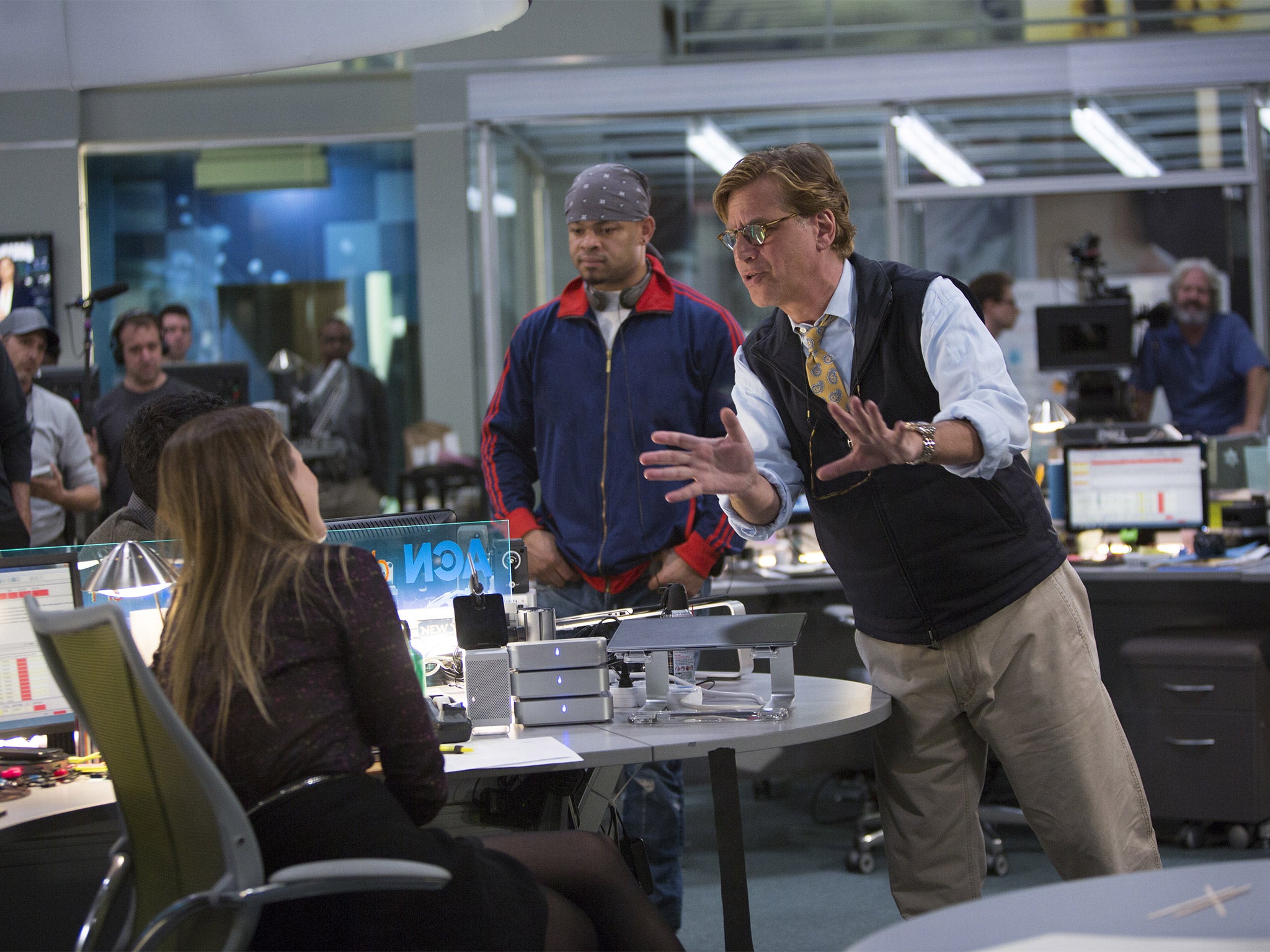Aaron Sorkin got it wrong with The Newsroom - it was doomed to fail
It aimed to do for broadcast news what the West Wing did for politics, but 15 years too late

I’ve never been to Equatorial Kundu, but I am familiar with its recent history, from the US-led humanitarian intervention of 2002 to the recent cover-up of an American intelligence agency blunder and subsequent riot.
Of course, you’ve never been to Kundu either; it’s a made-up country, one Aaron Sorkin fans will recognise from both the West Wing and The Newsroom. The former, the critically-acclaimed series about White House staff, was a triumph, whereas the latter, which concludes this week, never quite got off the ground. And while Kundu may be fictional, the two plotlines about it shed some light as to why The Newsroom was doomed to fail, despite not being all that different from the West Wing.
When it first aired in 2012 critics ripped The Newsroom apart; too much ‘speechifying’, complained the Washington Post. The consensus was that it was smug, its protagonist Will McAvoy arrogant and guilty of ‘mansplaining’. Three series on, Emily Mortimer's MacKenzie remained a grating flibbertigibbet, and Sorkin continued to present the ACN staff as possessing some monopoly on how to cover the news, despite errors such as the mishandled campus rape plot. Nevertheless, it exceeded expectations to become if not great, entertaining and well-scripted, with later episodes enhanced by Don and Sloane’s screwball romance and Maggie’s growing confidence. What it could never get past was that it aimed to do for broadcast news what the West Wing did for politics, 15 years too late.
Both shows portrayed a best possible world; variously presidential politics or journalism. Both, obviously, presented a fantasy. But while a better politics was perhaps imaginable back in the late 1990s, by the time The Newsroom aired it was an homage to something long gone; celebrating old-fashioned broadcast news as budgets were being slashed, audiences were heading elsewhere and trust in media was plummeting. And despite having made a film about Facebook, Sorkin was contemptuous of social media’s role in newsgathering.
But it was fiction, so Sorkin could get away with pretending the internet never happened to journalism. More ruinously, it put a mirror to a world nobody particularly wanted to look at. The West Wing offered a political reality where public figures did the right things for the right reasons, including in Kundu. At its heart was a liberal, intellectual, virtuous president; a Kennedy rather than a Nixon. In the dying days of the Clinton administration, Jed Bartlet was what Bill could have been; what many still hoped for from the Oval Office.

We’ve long lost that audacity of hope. Can you imagine a fictional president like Bartlet today - or a fictional Prime Minister? Post economic crash, and in the wake of the War on Terror and the bloodshed in Syria? Modern fictional leaders, whether in Homeland or House of Cards, are Machiavellian figures, embroiled in subterfuge; Nixons, not even flawed but brilliant Clintons. If Sorkin were to write about politics today, his main character would be John Hoynes.
With The Newsroom, Sorkin didn't read the runes. As the headlines have become ever more miserable, we've sought escapism from television, not the truth. Reality may dominate, but it’s a glossy, Kardashian-esque version; meanwhile we lap up crime dramas where mysteries are solved, fantasies like Game of Thrones, or stories of heroes fighting corruption in the system, like Homeland.
Today’s news – like today’s politics – is gloomy, so why would we want to watch it replayed as entertainment? Sorkin got it wrong because he pitched a show about everyday horrors - real environmental disasters, terrorist plots, weak politicians - at a time when those threats loomed all too real. And he didn’t even make them fictional.
Equally, in 2014, we no longer have as much appetite for Sorkin’s signature philosopher-king characters. The West Wing’s dreamers, preachers who wanted to rebuild the world, appealed because they represented the best in public life. Yet the last decade has seen a fall in trust in institutions, from governments to the media, in the US and across Western countries. Thus The Newsroom’s raconteurs came across as patronising, not inspirational. The characters were smug in the West Wing as in The Newsroom; back then we thought they had a right to be.
I wanted to love The Newsroom as I did the West Wing, and I maintain it could have succeeded despite its speechifying protagonists and Sorkin’s rather unreconstructed approach to women. After all, everyone in Bartlet's team was brighter and better than the wider population, the characters as condescending and the plotlines often as bleak. But if 15 years ago we could believe in Sorkin’s characters, always choosing the moral but difficult path, whether that was in Kundu or anywhere else, these days, we’re just that little bit too cynical.

Join our commenting forum
Join thought-provoking conversations, follow other Independent readers and see their replies